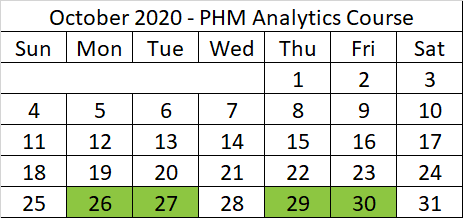Analytics for PHM Online Short Course

Course Dates: October 26, 27, 29, & 30, 2020 from 1:00 – 4:00 EDT (UTC-4:00)
Course Presenter: Dr. Neil Eklund
Course Administrator: Jeff Bird jeffbird@rogers.com
Overview
This course is intended for engineers, scientists, and managers who are interested in data driven methods for asset health management. You will learn how to identify potential data driven projects, visualize data, screen data, construct and select appropriate features, build models of assets from data, evaluate and select models, and deploy asset monitoring systems.
By the end of the course, you will have learned the essential skills of processing, manipulating and analyzing data of various types, creating advanced visualizations, detecting anomalous behavior, diagnosing faults, and estimating remaining useful life.
Note that this course is an advanced course with only a brief, high-level overview of PHM presented – students are expected to know the basics of PHM already. New practitioners are encouraged to take fundamentals course or contact the course leader to examine their background and skills.
Delivery Method
This course will be delivered virtually to a limited group of registrants, expected to be 25-30.
Course notes will be available to be printed and shipped to students. (Details to follow for the registered participants.)
Optional exercises will be presented in python in Google Colab.
Duration
Four, 4-hour afternoons with the exercises on your own but reviewed in class.
Course Credit
A PHM Society Certificate will be provided for nominally 1.6 (2.4) Continuing Professional Development Units to each participant completing the course (and exercises).
Who Should Attend
his advanced course is designed for two primary types of students:
- Managers who oversee asset health management projects, and want to know more about the technical details behind the process.
- Practitioners who want to know the theory and get hands-on experience for data driven PHM, including:
- Students
- New engineers and scientists
- Experienced engineers and scientists looking to update their skills and understanding data driven methods
- Project managers who incorporate data driven PHM in their projects
- Individuals with a general understanding of analytics who want to see how it is applied to PHM
Course Outline
Day 1 – Monday, October 26, 2020, 1:00 – 4:00 EDT
- Overview of Data-Driven PHM
- Review of Fundamental Statistics
- Data Visualization
- Introduction to Machine Learning
- Anomaly Detection (AD)
Day 2 – Tuesday, October 27, 2020, 1:00 – 4:00 EDT
- Decision Trees
- Random Forest (RF)
- Boosting (XGBoost)
- Review: Single Model, Bagging, Boosting
- Intro to Neural Networks
- Deep Autoencoders for Vibration Analysis
- Diagnosis and Prognosis
Day 3 – Thursday, October 29, 2020, 1:00 – 4:00 EDT
- Review of Exercise 1 results and issues
- Feature Extraction
- Feature Selection
- Model Evaluation and Characterizing Performance
- Model Selection
- Data-Driven and Hybrid Diagnosis
- Data Fusion
- Machine Learning for PHM Model Maintenance
- Case Study: DARPA Collective Mind Prognosis Project
- Practical Issues
Day 4 – Friday, October 30, 2020, 1:00 – 4:00 EDT
- Review of Exercise 2 results and issues
- Case Studies in Aviation
- Real-Time Fault Prediction and Avoidance for Commercial Aircraft Engines
- A Hybrid Approach to Bearing Spall Prognostics in Military Aircraft
- Introduction to Deep Learning
- Overview and examples
- Self-taught learning
- Deep learning for PHM
- Promising application areas for innovation
- Application area: Time series
- Feedback and evaluation
Course Presenter
Dr. Neil Eklund is an experienced technologist in the space of data science, Industrial Artificial Intelligence, machine learning, and evolutionary algorithms for multi-objective optimization, with significant experience in developing fielded solutions to industrial problems. With 20 years of deep technical experience across multiple industry segments – Aerospace, Energy, Healthcare, Finance, Rail, Oil & Gas, and US Government Research (DARPA; NASA, Department of Defense) – he has been the technical lead on a wide range of high-impact projects, resulting in 16 patents, with another four pending, and over 70 technical publications. Dr. Eklund has worked at some of the largest companies in the world – including General Electric Research and Schlumberger – and also a couple of five-person start-ups. This has allowed him to work on a wide variety of research projects, from early detection of cataract using intraocular photoluminescence to multi-objective bond portfolio optimization. Most recently, his work has focused on fielded, commercially viable asset management systems related to remote monitoring and diagnostics for military and commercial aircraft and oil & gas equipment. He currently works at the Palo Alto Research Centre in data analytics.
For information contact shortcourse@phmconference.org
